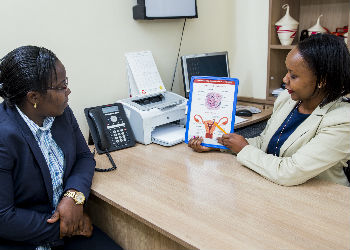Gynaecology Services
Aga Khan University Hospital, Nairobi is home to a team of specialist gynaecologists who are dedicated to providing the comprehensive care required to maintain women's health.
Gynaecology services at AKUH,N include:
General gynaecology consultations
If you are experiencing menstrual problems, (such as abnormal bleeding, irregular bleeding or painful periods), pelvic pain or infections, or menopausal symptoms kindly book a consultation with one of our gynaecologists. We can provide a diagnosis and create a treatment plan, which may either be medical or surgical. We offer a range of procedures, including laparoscopy and hysteroscopy. Consultations with our gynaecologists are available from Monday to Saturday.
Gynaecologic oncology
AKUH,N recommends that all women above 25 years should have regular Pap smear screening in order to detect pre-cancerous changes in the cervix. Should your gynaecologist detect any abnormalities in your Pap smear , colposcopy may be recommended. There is a colposcopy clinic every week. We also provide HPV vaccination.
We provide expert care for women with gynecologic cancers, this refers to cancers that arise from the woman’s reproductive tract that include: cervical cancer, endometrial cancer, ovarian cancer, vaginal cancer, and Vulva cancer.
Whether you are concerned about your cancer risk or are seeking treatment, our multidisciplinary team of cancer specialists which includes: Gynecologic Oncologist, Radiation Oncology, Palliative care, Chemotherapy nursing care, counseling and nutritionist services will work together to develop an individual treatment plan just for you. This collaboration provides patients and families with a combination of state-of-the-art diagnostic services, treatment plan and support for every stage of disease.
Minimal invasive surgery
 Minimal access surgery (MAS) or invasive surgery is undertaken with one or more small incisions instead of a large incision. The surgeon passes a telescope with a video camera through a small incision usually in the belly button into a body cavity. The surgeon then views the surgery on a TV monitor.
Minimal access surgery (MAS) or invasive surgery is undertaken with one or more small incisions instead of a large incision. The surgeon passes a telescope with a video camera through a small incision usually in the belly button into a body cavity. The surgeon then views the surgery on a TV monitor.
Surgical instruments are then passed through one or more other similar little incisions. The surgeon examines and operates on the area in question by viewing magnified images on a television. When the telescope is used to operate on the abdomen, the procedure is called laparoscopy.
The advantages of minimal access surgery include quick recovery and return to normal activities, less need for pain medications, less risk of hernia formation, early mobilization which reduces risk of blood clots, less chance of infection and is cost effective as the hospital stay is reduced.
At AKUH, we undertake most of our operations through keyhole (minimal access) and we are a training centre in this type of surgery. Our residents (post-graduate students) have to achieve a certain minimum level of competence to be allowed to independently practice at the end of their training.
Operations include laparoscopic for ectopic pregnancy, sterilization, removal of ovarian cysts, excision of endometriosis, removal of the womb and prolapse fixing.
Prior to the surgery patients are seen by faculty who discuss the merits and demerits of the various routes of surgery.
